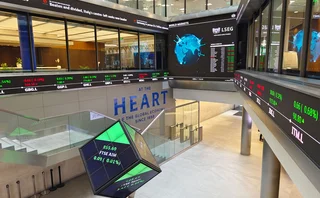
Australia house of the year: UBS
Consistency and deep local roots makes Swiss bank go-to house for Aussie supers

Structured Products Asia Awards 2016
Belying its relatively modest population, Australia boasts one of the world's largest pensions industries by assets under management. An army of affluent workers saving for a comfortable retirement coupled with generous contributions from employers has spawned a host of large superannuation funds, or supers, all of them hungry for yield-enhancing investments. Thanks to its deep roots in the country, UBS has made the provision of innovative equity derivatives solutions to the Aussie supers its own.
With Australian policy rates dropping to record lows, the pressure on supers' trustees and boards to have some level of active management has increased. That in turn has amped up the sophistication of the strategies and products that funds are willing to invest in. Consequently, structured derivatives trades have become much more common over the past couple of years - with UBS's longstanding relationships with the supers allowing it to fully capitalise on the trend.
"A lot of ground work was done four or five years ago, educating and cultivating relationships with superannuation funds with regard to the type of derivatives trades they are executing now," says Edward Burns, executive director for global equity derivatives at UBS in Sydney. "That early work, to no avail initially, set us up to be the preferred bank for derivatives trades. As that flow has picked up we have been able to capture it."
Clients say the edge UBS has over a thinning field of local and global rivals is its ability to offer liquidity in scale: the bank has traded multiple clips of more than A$1 billion (US$755 million) notional on S&P/ASX 200 index trades in the past 12 months. It quotes on orders in excess of A$500 million as a matter of course.
While other firms have retreated, our presence in Sydney has provided continuity of deal flow, trading, structuring and pricing… Remaining local assures our clients that we can respond to requests quickly and trade in a timely manner
Edward Burns, UBS
"We have managed and built out our platform over the years so that we can reduce the friction when clients look to trade with us," Burns says. "Our continuity in the market enables us to be consistent and reliable when it comes to pricing and quote requests."
Unlike most lenders, UBS has a dedicated onshore presence in Australia across derivatives sales, trading and structuring. The concentration of business functions onshore allows the bank to optimise pricing across flow derivatives, exotics and delta one trades - a key pillar of its consistency of service.
"While other firms have retreated, our presence in Sydney has provided continuity of deal flow, trading, structuring and pricing," says Burns. "[Some rivals] have shifted their derivatives trading businesses to Hong Kong, which tends to break the connection between sales and trading. Remaining local assures our clients that we can respond to requests quickly and trade in a timely manner."
Clients appreciate the bank's commitment to a local presence: a senior executive at one large onshore asset manager rates the bank's quality of service for equity products as "excellent", adding that he recognises the consistency of its pricing.
A further element of its reliability is the firm's capacity to recycle risk for clients, which allows it to consistently take on big trades where others won't. On single-stock derivatives trading, the firm runs a book of around 80 names on Australian underlyings - unmatched by any other house. The bank has also positioned itself as the go-to house in both exchange-traded and over-the-counter equity options, with a client base encompassing hedge funds, asset managers, overlay managers and insurance companies.
Its broad product offering is an advantage when it comes to risk recycling, with the bank able offer attractive pricing to funds looking to take risks such as correlation off its books - something rivals with narrower offerings are unable to match.
"The breadth of our offering enables clients to access competitive pricing across flow, structured and exotic derivatives," says Burns.
UBS has built its flow business around reverse convertibles, of which it has processed around A$200 million this year. Burns observes the products are the most widely used structured trade in Australia, with retail, wholesale and family office clients favouring them in the hunt for yield.
"As investors look to generate more performance out of their portfolios, we are very active in providing opportunistic trade ideas to our clients," he says. "We are proactive when we see movements in volatility to promote trade ideas and we pride ourselves on being very consistent in terms of our offering."
Only users who have a paid subscription or are part of a corporate subscription are able to print or copy content.
To access these options, along with all other subscription benefits, please contact info@risk.net or view our subscription options here: http://subscriptions.risk.net/subscribe
You are currently unable to print this content. Please contact info@risk.net to find out more.
You are currently unable to copy this content. Please contact info@risk.net to find out more.
Copyright Infopro Digital Limited. All rights reserved.
As outlined in our terms and conditions, https://www.infopro-digital.com/terms-and-conditions/subscriptions/ (point 2.4), printing is limited to a single copy.
If you would like to purchase additional rights please email info@risk.net
Copyright Infopro Digital Limited. All rights reserved.
You may share this content using our article tools. As outlined in our terms and conditions, https://www.infopro-digital.com/terms-and-conditions/subscriptions/ (clause 2.4), an Authorised User may only make one copy of the materials for their own personal use. You must also comply with the restrictions in clause 2.5.
If you would like to purchase additional rights please email info@risk.net
More on Awards
Clearing house of the year: LCH
Risk Awards 2025: LCH outshines rivals in its commitment to innovation and co-operation with clearing members
Best use of machine learning/AI: CompatibL
CompatibL’s groundbreaking use of LLMs for automated trade entry earned the Best use of machine learning/AI award at the 2025 Risk Markets Technology Awards, redefining speed and reliability in what-if analytics
Markets Technology Awards 2025 winners’ review
Vendors jockeying for position in this year’s MTAs, as banks and regulators take aim at counterparty blind spots
Equity derivatives house of the year: Bank of America
Risk Awards 2025: Bank gains plaudits – and profits – with enhanced product range, including new variants of short-vol structures and equity dispersion
Law firm of the year: Linklaters
Risk Awards 2025: Law firm’s work helped buttress markets for credit derivatives, clearing and digital assets
Derivatives house of the year: UBS
Risk Awards 2025: Mega-merger expected to add $1 billion to markets revenues, via 30 integration projects
Interest rate derivatives house of the year: JP Morgan
Risk Awards 2025: Steepener hedges and Spire novations helped clients navigate shifting rates regime
Currency derivatives house of the year: UBS
Risk Awards 2025: Access to wealth management client base helped Swiss bank to recycle volatility and provide accurate pricing for a range of FX structures
Most read
- Top 10 operational risks for 2025
- For US Treasury algos, dealers get with the program
- DeepSeek success spurs banks to consider do-it-yourself AI























